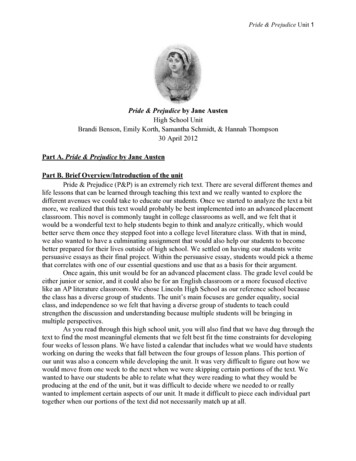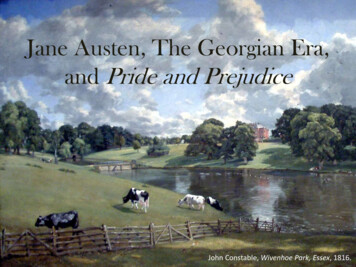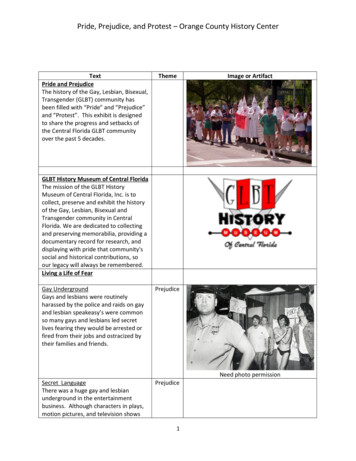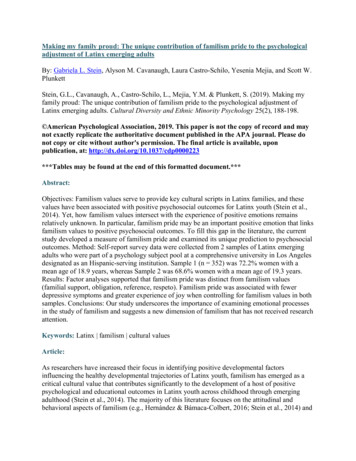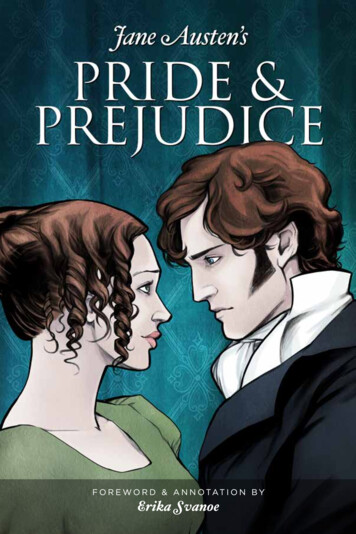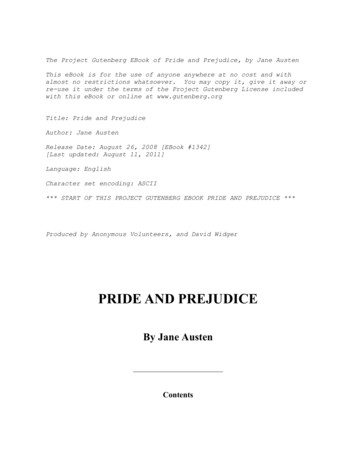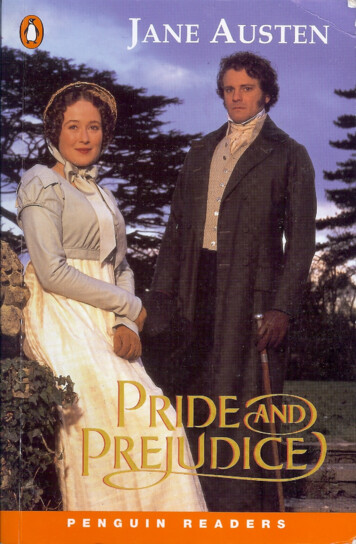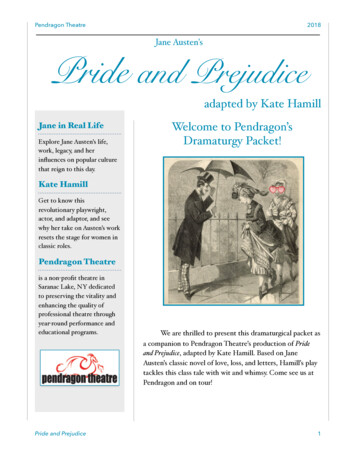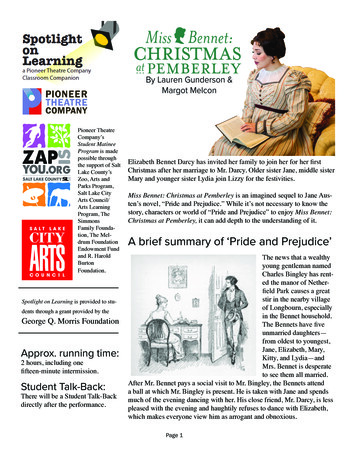
Transcription
Pioneer TheatreCompany’sStudent MatineeProgram is madepossible throughthe support of SaltLake County’sZoo, Arts andParks Program,Salt Lake CityArts Council/Arts LearningProgram, TheSimmonsFamily Foundation, The Meldrum FoundationEndowment Fundand R. HaroldBurtonFoundation.Spotlight on Learning is provided to students through a grant provided by theGeorge Q. Morris FoundationApprox. running time:2 hours, including onefifteen-minute intermission.Student Talk-Back:There will be a Student Talk-Backdirectly after the performance.Elizabeth Bennet Darcy has invited her family to join her for her firstChristmas after her marriage to Mr. Darcy. Older sister Jane, middle sisterMary and younger sister Lydia join Lizzy for the festivities.Miss Bennet: Christmas at Pemberley is an imagined sequel to Jane Austen’s novel, “Pride and Prejudice.” While it’s not necessary to know thestory, characters or world of “Pride and Prejudice” to enjoy Miss Bennet:Christmas at Pemberley, it can add depth to the understanding of it.A brief summary of ‘Pride and Prejudice’The news that a wealthyyoung gentleman namedCharles Bingley has rented the manor of Netherfield Park causes a greatstir in the nearby villageof Longbourn, especiallyin the Bennet household.The Bennets have fiveunmarried daughters—from oldest to youngest,Jane, Elizabeth, Mary,Kitty, and Lydia—andMrs. Bennet is desperateto see them all married.After Mr. Bennet pays a social visit to Mr. Bingley, the Bennets attenda ball at which Mr. Bingley is present. He is taken with Jane and spendsmuch of the evening dancing with her. His close friend, Mr. Darcy, is lesspleased with the evening and haughtily refuses to dance with Elizabeth,which makes everyone view him as arrogant and obnoxious.Page 1
Continued from page 1.At social functions over subsequent weeks, however, Mr. Darcyfinds himself increasingly attracted to Elizabeth’s charm and intelligence. Jane’s friendship with Mr.Bingley also continues to burgeon,and Jane pays a visit to the Bingley mansion. On her journey to thehouse she is caught in a downpourand catches ill, forcing her to stayat Netherfield for several days. Inorder to tend to Jane, Elizabethhikes through muddy fields andarrives with a spattered dress,much to the disdain of the snobbish Miss Bingley, Charles Bingley’s sister. Miss Bingley’s spiteonly increases when she noticesthat Darcy, whom she is pursuing, pays quite a bit of attention toElizabeth.When Elizabeth and Jane returnhome, they find Mr. Collins visiting their household. Mr. Collinsis a young clergyman who standsto inherit Mr. Bennet’s property,which has been “entailed,” meaning that it can only be passeddown to male heirs. Mr. Collinsis a pompous fool, though he isquite enthralled by the Bennetgirls. Shortly after his arrival, hemakes a proposal of marriage toElizabeth. She turns him down,wounding his pride. Meanwhile,the Bennet girls have becomefriendly with militia officers stationed in a nearby town. Amongthem is Wickham, a handsomeyoung soldier who is friendly toward Elizabeth and tells her howDarcy cruelly cheated him out ofan inheritance.“Mr. Darcy findshimself increasinglyattracted to Elizabeth’scharm and intelligence.”Page 2At the beginning of winter, theBingleys and Darcy leave Netherfield and return to London, muchto Jane’s dismay. A further shockarrives with the news that Mr.Collins has become engaged toCharlotte Lucas, Elizabeth’s bestfriend and the poor daughter of alocal knight. Charlotte explains toElizabeth that she is getting olderand needs the match for financialreasons. Charlotte and Mr. Collinsget married and Elizabeth promisesto visit them at their new home. Aswinter progresses, Jane visits thecity to see friends (hoping also thatshe might see Mr. Bingley). However, Miss Bingley visits her andbehaves rudely, while Mr. Bingleyfails to visit her at all. The marriageprospects for the Bennet girls appear bleak.That spring, Elizabeth visits Charlotte, who now lives near the homeof Mr. Collins’s patron, LadyCatherine de Bourgh, who is alsoDarcy’s aunt. Darcy calls on LadyCatherine and encounters Elizabeth, whose presence leads him tomake a number of visits to the Collins’s home, where she is staying.One day, he makes a shocking proposal of marriage, which Elizabethquickly refuses. She tells Darcythat she considers him arrogantand unpleasant, then scolds him forsteering Bingley away from Janeand disinheriting Wickham. Darcyleaves her but shortly thereafterdelivers a letter to her. In this letter,he admits that he urged Bingleyto distance himself from Jane, butclaims he did so only because hethought their romance was not serious. As for Wickham, he informsElizabeth that the young officer is aliar and that the real cause of theirContinues to page 3.
Continued from page 1.disagreement was Wickham’sattempt to elope with his youngsister, Georgiana Darcy.This letter causes Elizabeth to reevaluate her feelings about Darcy.She returns home and acts coldlytoward Wickham. The militia isleaving town, which makes theyounger, rather man-crazy Bennetgirls distraught. Lydia manages toobtain permission from her fatherto spend the summer with an oldcolonel in Brighton, where Wickham’s regiment will be stationed.With the arrival of June, Elizabethgoes on another journey, this timewith the Gardiners, who are relatives of the Bennets. The trip takesher to the North and eventually tothe neighborhood of Pemberley,Darcy’s estate. She visits Pemberley, after making sure that Darcyis away, and delights in the building and grounds, while hearingfrom Darcy’s servants that he is awonderful, generous master. Suddenly, Darcy arrives and behavescordially toward her. Making nomention of his proposal, he entertains the Gardiners and invitesElizabeth to meet his sister.Shortly thereafter, however, aletter arrives from home, tellingElizabeth that Lydia has elopedwith Wickham and that the coupleis nowhere to be found, whichsuggests that they may be livingtogether out of wedlock. Fearfulof the disgrace such a situationwould bring on her entire family, Elizabeth hastens home. Mr.Gardiner and Mr. Bennet go off tosearch for Lydia, but Mr. Benneteventually returns home emptyhanded. Just when all hope seemslost, a letter comes from Mr. Gardiner saying that the couple hasbeen found and that Wickham hasagreed to marry Lydia in exchangefor an annual income. The Bennetsare convinced that Mr. Gardinerhas paid off Wickham, but Elizabeth learns that the source of themoney, and of her family’s salvation, was none other than Darcy.Now married, Wickham and Lydiareturn to Longbourn briefly, whereMr. Bennet treats them coldly.They then depart for Wickham’snew assignment in the North ofEngland. Shortly thereafter, Bingley returns to Netherfield and resumes his courtship of Jane. Darcygoes to stay with him and paysvisits to the Bennets but makesno mention of his desire to marryElizabeth. Bingley, on the otherhand, presses his suit and proposesto Jane, to the delight of everyone but Bingley’s haughty sister.While the family celebrates, LadyPage 3Catherine de Bourgh pays avisit to Longbourn. She cornersElizabeth and says that she hasheard that Darcy, her nephew, isplanning to marry her. Since sheconsiders a Bennet an unsuitablematch for a Darcy, Lady Catherine demands that Elizabethpromise to refuse him. Elizabethspiritedly refuses, saying sheis not engaged to Darcy, butshe will not promise anythingagainst her own happiness. Alittle later, Elizabeth and Darcygo out walking together and hetells her that his feelings havenot altered since the spring. Shetenderly accepts his proposal,and both Jane and Elizabeth mmary/
History of ChristmasIt's hard to imagine now, but atthe beginning of the 19th centuryChristmas was hardly celebrated.Many businesses did not even consider it a holiday. However by theend of the century it had becomethe biggest annual celebration andtook on the form that we recognisetoday.The transformation happenedquickly, and came from all sectorsof society.one shilling each, these were priceyfor ordinary Victorians and so werenot immediately accessible. However the sentiment caught on andmany children - Queen Victoria’sincluded – were encouraged tomake their own Christmas cards. Inthis age of industrialisation colourprinting technology quickly became more advanced, causing theprice of card production to dropsignificantly. Together with the introduction of the halfpenny postagerate, the Christmas card industrytook off. By the 1880s the sendingof cards had become hugely popular, creating a lucrative industrythat produced 11.5 million cards in1880 alone. The commercialisationof Christmas was well on its way.Another commercial Christmasindustry was borne by Victorians in1848 when a British confectioner,Tom Smith, invented a bold newway to sell sweets. Inspired by aBritish Christmas Crackerstrip to Paris where he saw bon bons– sugared almonds wrapped inMany attribute the change to Queentwists of paper – he came up withVictoria, and it was her marriagethe idea of the Christmas cracker:to the German-born Prince Alberta simple package filled with sweetsthat introduced some of the mostthat snapped when pulled apart.prominent aspects of Christmas.The sweets were replaced by smallIn 1848, the Illustrated Londongifts and paper hats in the lateNews published a drawing of theVictorian period, and remain inroyal family celebrating around athis form as an essential part of adecorated Christmas tree, a tradimodern Christmas.tion that was reminiscent of PrinceAlbert’s childhood in Germany.Decorating the home at ChristSoon every home in Britain had amas also became a more elaboratetree bedecked with candles, sweets,affair. The medieval tradition offruit, homemade decorations andusing evergreens continued, howsmall gifts.ever the style and placement ofthese decorations became moreIn 1843, Henry Cole commisimportant. The old custom ofsioned an artist to design a card forsimply decking walls and windowsChristmas. The illustration showedwith sprigs and twigs was sniffeda group of people around a dinnerat. Uniformity, order and elegancetable and a Christmas message. AtPage 4were encouraged. There wereinstructions on how to make elaborate synthetic decorations for thoseresiding in towns. In 1881, Cassell’s Family Magazine gave strictdirections to the lady of the house:“To bring about a general feelingof enjoyment, much depends on thesurroundings It is worth while tobestow some little trouble on thedecoration of the rooms.”Gift giving had traditionally beenat New Year but moved as Christmas became more important tothe Victorians. Initially gifts wererather modest – fruit, nuts, sweetsand small handmade trinkets. Thesewere usually hung on the Christmas tree. However, as gift givingbecame more central to the festival,and the gifts became bigger andshop-bought, they moved under thetree.The Christmas feast has its rootsfrom before the Middle Ages, butit’s during the Victorian period thatthe dinner we now associate withChristmas began to take shape.Examination of early Victorianrecipes shows that mince pies wereinitially made from meat, a tradition dating back to Tudor times.However, during the 19th centurythere was a revolution in the com-Christmas supperContinues to page 5.
position of this festive dish. Mixeswithout meat began to gain popularity within some of the higherechelons of society and became themince pies we know today.The roast turkey also has its beginnings in Victorian Britain. Previously other forms of roasted meatsuch as beef and goose were thecentrepiece of the Christmas dinner. The turkey was added to thisby the more wealthy sections of thecommunity in the 19th century, butits perfect size for a middle classfamily gathering meant it becamethe dominant dish by the beginningof the 20th century.While carols were not new to theVictorians, it was a tradition thatthey actively revived and popularised. The Victorians consideredcarols to be a delightful form ofmusical entertainment, and a pleasure well worth cultivating. Oldwords were put to new tunes andthe first significant collection ofcarols was published in 1833 for allto enjoy.The Victorians also transformed theidea of Christmas so that it becamecentred around the family. Thepreparation and eating of the feast,decorations and gift giving, entertainments and parlour games - allwere essential to the celebration ofthe festival and were to be sharedby the whole family.piness encapsulate the spirit of theVictorian Christmas, and are verymuch a part of the Christmas wecelebrate ory.shtmlA note about entail.The basis of wealth, status andpower in nineteenth century England was fundamentally land, asit had been for centuries. And theoverriding concern of the greatlanded families who dominatedEnglish life was to maintain theirinfluence and affluence downthrough the years by transmitting their enormous landed estatesintact, generation after generation,to their descendants. A way to dothis had, in fact, been found, andit had two elements. The first wasthe right of primogeniture, whichmeant that all the land in eachgeneration was left to the eldest soninstead of its being divided amongall the children. The second wasentail, which meant that sufficientrestrictions were put on whatcould be done to the estate bythat eldest son to ensure thatwhen he died his eldest son inturn would inherit the estateintact.What if all the children weregirls? This, it will be remembered, is the problem of poorMr. Bennet in “Pride andPrejudice.” With daughters,as we have seen, the familyname might disappear if theyinherited the property, so whatshould be done in this situation? Quite often, the answerwas that the deed of settlementor will entailng the propertywould provide for a lateral passto another branch of the familythat did have a young male.From “What Jane Austen Ate andCharles Dickens Knew” by DanielPoolWhile Charles Dickens did notinvent the Victorian Christmas,his book “A Christmas Carol” iscredited with helping to popularise and spread the traditions ofthe festival. Its themes of family,charity, goodwill, peace and hapPage 5
OUR CASTJULIE KRAMER (Director) At PTC: Outside Mullingar on the mainstage andPerpetual Girl, A Requiem for August Moon, Slow Food and True Art for Playby-Play. Kramer directed her adaptation of Rona Jaffe’s The Best of Everythingin New York (Critics’ Pick – The New York Times and Time Out, published byDramatists Play Service).Greg Balla*(Fitzwilliam Darcy)GREG BALLA* (Fitzwilliam Darcy) Off Broadway: Straight, Blue Man Group.Other NY and Regional: You Can’t Kiss a Movie (HERE Arts), Power Plays(New Dramatists NYC)Jamen Nanthakumar*(Arthur de Bourgh)RACHEL CLAUSEN* (Jane Bingley) Regional Theater: Love’s Labour’sLost (Queen of France) with Elm Shakespeare, Beowulf (Warrior) with TrinityRep, USA (Isadora Duncan) with Breadloaf Acting Ensemble and A MidsummerNight’s Dream and Macbeth (Titania and Witch) with Camden ShakespeareFestival.Rachel Clausen*(Jane Bingley)LOGAN JAMES HALL* (Charles Bingley) was last seen as Jim O’Connorin The Glass Menagerie (PTC). A few favorite theater credits include: FultonTheater’s Venus In Fur (Best Actor in a Play; Broadway World) and Red (Ken),Vermont Stage’s Sex with Strangers (Ethan Kane) and North Carolina TheaterCenter’s wit (Jason Posner).Emily Nash(Elizabeth Darcy)JESSICA NAIMY* (Lydia Wickham) Broadway: Honeymoon In Vegas.National Tour: South PacificLogan James Hall*(Charles Bingley)JAMEN NANTHAKUMAR* (Arthur de Bourgh) Recent Credits include: AFunny Thing Happened on the Way to the Forum (Pittsburgh Public Theater),Under the Bodhi Tree (NY), The Fantasticks (Pittsburgh Public Theater),LUDO’s Broken Bride (NY), The Light in the Piazza (NY).EMILY NASH (Elizabeth Darcy) is a senior in the Actor TrainingProgram at the University of Utah.Savannah Moffat(Anne de Bourgh)SAVANNAH MOFFAT (Anne de Bourgh) is a senior in the ActorTraining Program at the University of Utah.Jessica Naimy*(Lydia Wickham)ELIZABETH RAMOS* (Mary Bennet) Off-Broadway: The Surgeon and HerDaughters (Cherry Lane Theatre, Dir. Adrienne Campbell-Holt); The Idea of Me(Cherry Lane Theatre, Dir. Jose Zayas); A Month in the Country (Classic StageCompany, Dir. Erica Schmidt).*Member of Actor’s Equity AssociationElizabeth Ramos*(Mary Bennet)
ten's novel, "Pride and Prejudice." While it's not necessary to know the story, characters or world of "Pride and Prejudice" to enjoy Miss Bennet: Christmas at Pemberley, it can add depth to the understanding of it. The news that a wealthy young gentleman named Charles Bingley has rent-ed the manor of Nether-field Park causes a great
